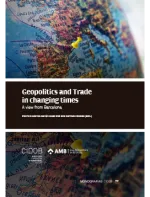Introduction. Geopolitics and Trade in changing times. A view from Barcelona

Economics studies the management of scarce resources given infinite needs. Management means prioritising to achieve established objectives. The formulation of objectives and prioritisation are determined by two essential components: ideology (values) and the correlation of forces, in other words, politics. Hence the close link between politics and economics. A great deal of work in the social sciences studies this relationship, and particularly the organisation of the planet’s productive structures.
Various methodologies can help in this analysis. Institutionalist schools maintain that the rules of the game determine the behaviour of the different agents and their subsequent development (Acemoglu, Robinson and North are some of key authors in this area). Indeed, significant scientific consensus exists over the links between political geostrategy and geoeconomics. Niall Ferguson and Eric Hobsbawm, for example, have studied the relationship from different long-term analytical perspectives. From empires to latecomers, a country or city’s political position in the international context has largely been conditioned by the country’s interests, economic capacity and business structure, and vice versa.